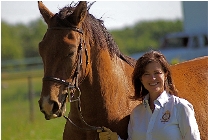You've decided to buy a horse and you have now located the horse of your dreams. There are a lot of emotions involved. Try very hard to put your emotions aside so you can make a sound financial and economic investment. Rarely do horses come with a money-back guarantee.
When you buy a house you do your due diligence. One of your steps in doing due diligence is hiring a home inspector who will go over both the inside and outside of your house. The same process should occur when you buy a horse, you should hire a veterinarian that will inspect the inside and outside of the horse.
Knowing and understanding the health and condition of a horse before completing a purchase is one of the most important steps to be taken before you actually buy the horse and make that financial investment. The expense of an exam is well worth it compared to the long-term costs of keeping, maintaining and caring for a horse with health issues. If you buy the horse without a veterinary exam, you may miss something that would make this horse un-saleable in the future or affect its current and future value.
You and your veterinarian should talk and discuss what should be reviewed based on what you will be using the horse for. Some helpful information to have and provide your vet prior to the examination would be vaccination and worming schedule, feed and use of supplements, drugs or injections. Some baseline review by your vet should cover the following:
- Pulse, respiration and body temperature
- The heart and lungs
- The nostrils, ears and eyes
- Limb and body confirmation
- Body and limbs for signs of previous injuries and disease
- Blood samples for diseases and drug use
- Teeth and mouth
- Feet (visually and with hoof testers)
- Horse in motion traveling in a straight line, circles and under tack (if possible). Should be performed at a walk, trot and canter.
- Flexion test for the joint and limbs
- Monitor horses behavior while being handled
If some part of the clinical examination alerts the veterinarian or, if you chose a more in-depth examination, there are a variety of additional test that can be performed. The test can give the veterinarian a clearer idea or a definitive answer to a particular issue. These are test such as: x-rays, nerve blocks, urine test, endoscope and ultrasonic examinations along with a variety of other tests.
Remember, the veterinarian you hire is your advocate and can provide you with objective, health-related information. Try to be present at the exam if at all possible. Talk directly to the veterinarian yourself. Remember, it's your investment. Do not be afraid to ask questions if you do not understand his findings. This is very important in making an informed decision. No horse is perfect in every aspect and some medical faults may never interfere with your horses intended use. But, the pre-purchase exam can help you determine if you can afford the horse on an ongoing basis should he require special shoes, exercise, nutrition, joint injections or some other maintenance requirements.
The Pre-purchase exam, just like the home inspection, can provide you valuable information that can assist you in making an informed decision. Even if you decide not to buy, the money spent on the examination can save you headache, heartbreak and money. There is always another horse to buy out there and a veterinarian exam can assist you in finding the perfect horse to meet your needs.
Bridget Brandon is a Senior Certified Equine Appraiser with the American Society of Equine Appraisers and is USPAP Certified. Bridget has been a certified equine appraiser since 2001 and has worked on numerous equine related lawsuits as an appraiser, consultant and expert witness.
©Copyright - All Rights Reserved
DO NOT REPRODUCE WITHOUT WRITTEN PERMISSION BY AUTHOR.










